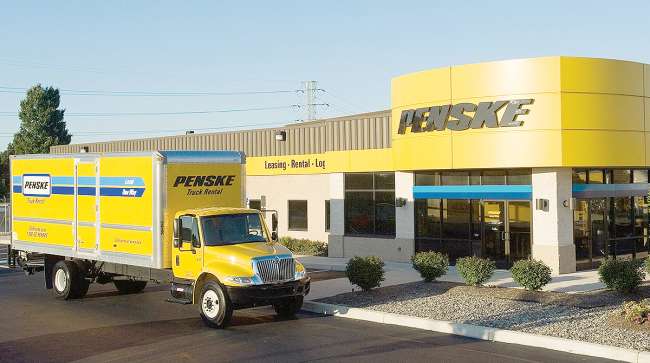Staff Reporter
Penske Joins Autonomous Vehicle Coalition PAVE

Penske Truck Leasing has joined Partners for Automated Vehicle Education, a coalition of industry leaders that seeks to educate and assure the public about automated vehicles, according to a news release from the two organizations.
It was the first membership of a major trucking firm for PAVE, which was founded in 2018, according to Penske.
PAVE is a coalition of industry, nonprofit and academic institutions launching what appears to be the first major campaign to inform the public and policymakers about the potential and the reality of advanced vehicle technologies, focusing on autonomy.

The technologies are not just full autonomy — what industry leaders call “Level 5” autonomy — but a range of options that includes driver-assistance software.
Penske officials told Transport Topics they signed up for PAVE after seeing some autonomous trucking technology at CES, the world’s largest technology show, held in January in Las Vegas. It was at CES that Penske realized that membership in PAVE might help the Reading, Pa., company communicate with customers about the growing sophistication of its trucks. Penske owns 311,000 vehicles through its leasing, logistics and rental companies.
Penske Logistics ranks No. 19 on the Transport Topics Top 100 list of the largest for-hire carriers in North America and No. 8 on the Transport Topics Top 50 list of the largest logistics companies in North America.
“We feel like there is a huge opportunity for education,” Senior Vice President of Marketing Sherry Sanger told TT. “We feel [autonomous vehicles] are a bit of a misunderstood space.”

Sanger
Sanger said automation takes many forms in trucking, ranging from existing collision-avoidance and lane-departure warning systems to other driver-assisted technologies. Advanced driver assistance in trucks and fully automated trucks could provide a range of societal and industry benefits including safety, environmental and productivity when it comes to mobility, according to Sanger.
Varying levels of automation already are happening in the trucking industry, so Penske decided to advance a better understanding and “separate the hype from realities with our customers and general public when it comes to automated trucks,” Sanger said.
Yet full autonomy of trucks is a ways off, she said, as preliminary levels of autonomy are arriving.
Level 4 autonomy would have a driver present, although the truck is driving itself, according to Sanger and Bill Combs, director of connected fleet services. And Level 5, the ultimate step, would be driverless trucks rolling down the highways with no human in the vehicle.
Penske supports the preliminary technologies because they help the drivers stay safer, Combs told TT.

Combs
“PAVE members are united by a belief in the power of automated vehicles to improve safety, mobility and sustainability, and also a belief that, to achieve these benefits, we need to make sure everyone has the knowledge to participate in the conversation about the future of transportation,” Coalition Manager Tara Andringa said in a statement.
Andringa said PAVE’s education campaign includes hands-on public demonstration events; policymaker workshops for stakeholders at the local, state and federal levels; educational materials for industry sales personnel and others who work directly with consumers; and active online efforts.
PAVE said it hopes to clarify autonomous tech’s current state and its potential, including the benefits in safety, mobility and sustainability — “without unjustified hype or unreasonable fear.”
An industry expert said trucking firms are feeling a growing need to assure the public and policymakers about autonomous vehicles and trucks.
“The public needs to be assured by manufacturers and legislators that autonomous trucks will not be allowed on the road without drivers until such a time that they are significantly safer than they currently are with drivers,” said Rob Hooper, CEO of Atlantic Logistics in Jacksonville, Fla. “This does not mean that there will not be failures, but they need to be safer on average and demonstrated to save a significant number of lives … [A truck weighing] 80,000 pounds cruising down the interstate is scary, but once manufacturers are able to demonstrate with safety drivers present that the technology is working and that driver interventions are not needed, the public will embrace the savings at the grocery store and the mall.”
And states are embracing the technology, Hooper said.
Welcome Penske! https://t.co/7bAHWSj465 — PAVE Campaign (@PAVECampaign) May 1, 2019
“States have been courting the technology firms to invest and to develop and test on their roads,” Hooper told TT. “Legislation in many states has moved easily through legislatures. Florida just passed a couple of additional laws legalizing autonomous vehicles. The biggest threat facing legislation is another catastrophic failure before the technology has matured and been proven safe and reliable.”
But Penske is betting the levels of autonomous technology will improve safety, as trucks become more innovative and controlled through software and hardware.
“It’s never been a more exciting time to be in the industry,” Sanger said.

